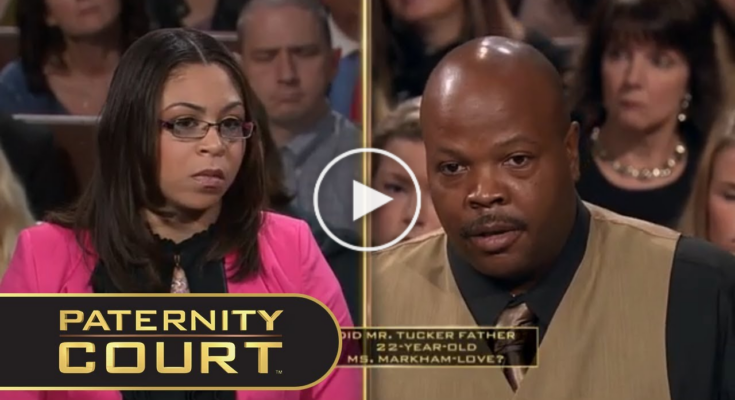Paternity disputes are complex legal cases that involve the determination of a child’s biological father. These emotional and often tumultuous battles can have a profound impact on the individuals involved. In the case of Markham-Love v. Tucker/Gholston, we witness the struggles of Brittnee Markham-Love, her mother Shereen Nassiripour, and two potential fathers, Mr. Tucker and Mr. Gholston. This article explores their emotional journey, highlighting the significance of transparency, forgiveness, and understanding in family dynamics.
“Ms. Markham-Love, you are here because you say your childhood was a complete nightmare. Wow! You claim your mother, Ms. Nassiripour, lost you to foster care and left you torn between two fathers, including the defendant.” – Judge Lake
Brittnee Markham-Love opens up about her challenging upbringing, having spent her childhood in foster care and torn between two potential fathers. The uncertainty surrounding her parentage has left deep emotional scars.
Brittnee’s emotional struggle is apparent when she says, “I got put in foster care, had to live with complete strangers… I found out at 12 that Myron here, Mr. Tucker, may not be my father.” This revelation raises questions about her true parentage and intensifies the need for closure.
“You knew this man to be your father your whole life and then you realize he may not be. You don’t really have a relationship with Mr. Gholston.” – Judge Lake
Brittnee’s conflicted emotions about her potential fathers highlight the profound impact a paternity dispute can have on an individual’s sense of identity and belonging. Having known Mr. Tucker as her father for her entire life, she faces the challenge of accepting that he might not be her biological father.
“I do love my daughter, but you know what, I went to prison, I’ve done a lot of bad things in my life, I forgave myself. When I got out, I asked her for, you know when she’s ready to forgive me.” – Shereen Nassiripour
Ms. Nassiripour expresses remorse for her past mistakes and her desire to reconcile with her daughter. Despite her past struggles with addiction and incarceration, she seeks redemption and aims to rebuild their fractured relationship.
“I just want closure. So, if Mr. Tucker is my father, I know his family. If Mr. Gholston is my father, I would want to know his family.” – Brittnee Markham-Love
Brittnee’s plea for closure underscores the importance of knowing her true parentage and having a sense of belonging to her biological family. Her desire to connect with her potential fathers’ families reflects a longing to discover her roots and understand her heritage.
“In the case of Markham-Love v. Tucker/Gholston, as it pertains to 22-year-old Brittnee Markham-Love, Mr. Tucker, you are not her father.” – Judge Lake
The DNA test results reveal that neither Mr. Tucker nor Mr. Gholston is Brittnee’s biological father, leaving all parties shocked and emotionally shaken. The revelation shatters any lingering hopes and adds to the complexity of Brittnee’s identity crisis.
The case of Markham-Love v. Tucker/Gholston illuminates the intricate and deeply emotional nature of paternity disputes. Brittnee Markham-Love’s journey to seek truth and closure reminds us of the importance of transparency, empathy, and communication in family relationships.
Paternity disputes may leave lasting scars, but the pursuit of truth and understanding can foster healing and growth. As we navigate these challenging situations, it is crucial to offer support and compassion to those involved. The search for paternal identity may be fraught with difficulties, but with love and perseverance, families can find reconciliation and unity.
The court’s unexpected DNA results serve as a turning point for all parties involved. Despite the shock and disappointment, the revelation offers a fresh start for Brittnee and her mother to rebuild their relationship on a foundation of honesty and understanding.
In the end, the journey to finding truth and closure is not just about determining biological connections; it is about the emotional growth and healing that come from facing difficult realities. It is a reminder that the bonds of family go beyond genetic ties and are built on love, support, and shared experiences.
As Brittnee moves forward, she will have the opportunity to forge new connections and embrace the families of both Mr. Tucker and Mr. Gholston. Though the road may be challenging, with determination and compassion, she can create a fulfilling and meaningful relationship with her extended family.
The case of Markham-Love v. Tucker/Gholston serves as a poignant reminder that the journey to finding truth and closure in paternity disputes is not confined to the courtroom. It is an emotional expedition that requires empathy, understanding, and a commitment to healing fractured relationships.
As society continues to grapple with the complexities of paternity disputes, let us remember that each individual’s journey is unique and deserves the utmost respect and sensitivity. By approaching these cases with empathy and support, we can help families navigate the path to truth and closure, fostering healing and unity in the face of uncertainty.



